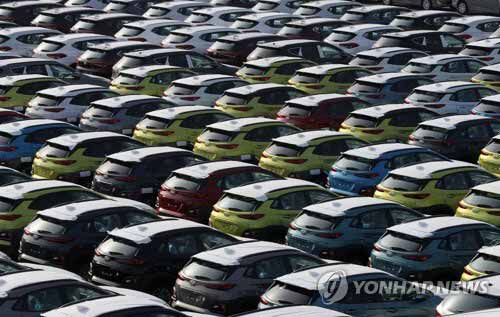Koreans car in concern for ‘high cost & law efficiency’ while Chinese car industry to grow fast
Ye Jin Soo | jinye@ | 2018-03-05 11:08:10

By Yonhab News
If we do not change the production structure of `High cost and low efficiency`, there is an analysis among automobile experts that not only Korea GM but also Ssangyong, Renault Samsung, Hyundai and Kia Motors cannot be relieved. It is pointed out that the persistent "high cost and low efficiency" problems can be more fatal as the Chinese auto makers are booming, competitiveness weakened due to KRW appreciation.
According to the industry on March 4, Toyota and Lexus sales in the United States in February were 174,000 units, a 4.5% increase from the previous year, and Volkswagen increased by 6.0% to 25,000 units. In contrast, Hyundai and Kia Motors decreased by 13% and 5%, respectively, to 46,000 and 41,000, respectively.
Exports of Korean automakers declined in February. Hyundai Motor fell 8.6 %, Kia Motors -9.9 %, Korea GM -9.4%, Renault Samsung -15.4 % and Ssangyong Motor-25.5 %. Hyundai Motor`s Chinese subsidiary Beijing Hyundai`s January sales volume declined 25% YoY to 60,000 units.
Meanwhile, China Geo-car and Chang-Cheong Motor have been tracking Korean cars with terrific momentum with annual sales of over 1 million units last year. An industry official said, "Even if the exchange rate falls, US trade pressure, and the number of days of operation in February are 19 days and 5 days less than the same month last year (24th), the export decrease is too large. "If the structure of `high wages and low productivity` is not fundamentally improved, it is difficult to escape easily in this situation," he said.
Korean cars are being immersed in imported cars. The market share of import cars in Korea (based on logarithm) increased from 15.8% in 2014 to 16.7% last year, and its share based on sales soared from 31.4% in 2014 to 32.1% in 2016.
On the other hand, Ssangyong has not been able to overcome chronic sluggish exports despite robust domestic sales. Ssangyong lost its operating loss of KRW 65.3 billion last year. Mahindra is seeking to enter Ssangyong Motor and the US market, but the industry analysis shows that it is not easy to penetrate the big US and Chinese markets.
Renault Samsung Motors may be diverted by the Renault-Nissan Alliance allocation. Due to intensive restructuring, Nissan Log`s US export log volume was allocated in 2014. However, the fact that there are few new car injections to target Korean domestic market this year is the worry of Renault Samsung Motors.
According to an industry source, GM Korea has applied for retirement from April 13 to February 2. As a result, about 2400 employees, or 15 percent of the total of 16,000 employees in Korea, have applied for retirement. It is an observation both inside and outside Korea that it has failed to secure sustainability and surplus structure through voluntary retirement until this day.
The Korea Automobile Manufacturers Association said, "The Korean automobile industry has reached a competitive level only in the small car segment of less than US $ 20,000, and has faced a costly and low-efficiency production structure." According to the association survey, the average wages of five domestic automakers rose by 83.9% compared to 2005, exceeding that of Japanese Toyota (91,040,000 won) and Germany`s Volkswagen (80,400,000 won) as of 2016. On the other hand, the time required to produce one car is 26.8 hours, which is 11% and 14% more than Toyota (24.1 hours) and GM (23.4 hours), respectively.
Also, the competitiveness of the automobile industry is the key to price and production flexibility. Korean companies are faced with high wage increase rates, low productivity, and lack of work flexibility, resulting in a decline in production and sales, and R & D capacity to narrow the technology gap in high value- There is no indication that he lost.
By Ye Jin Soo jinye@
